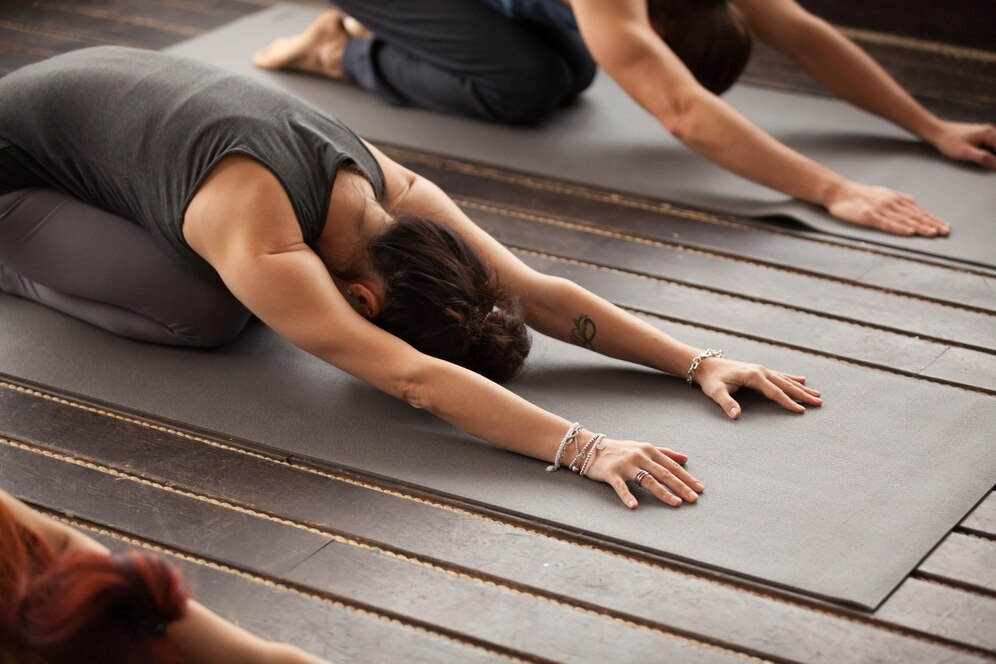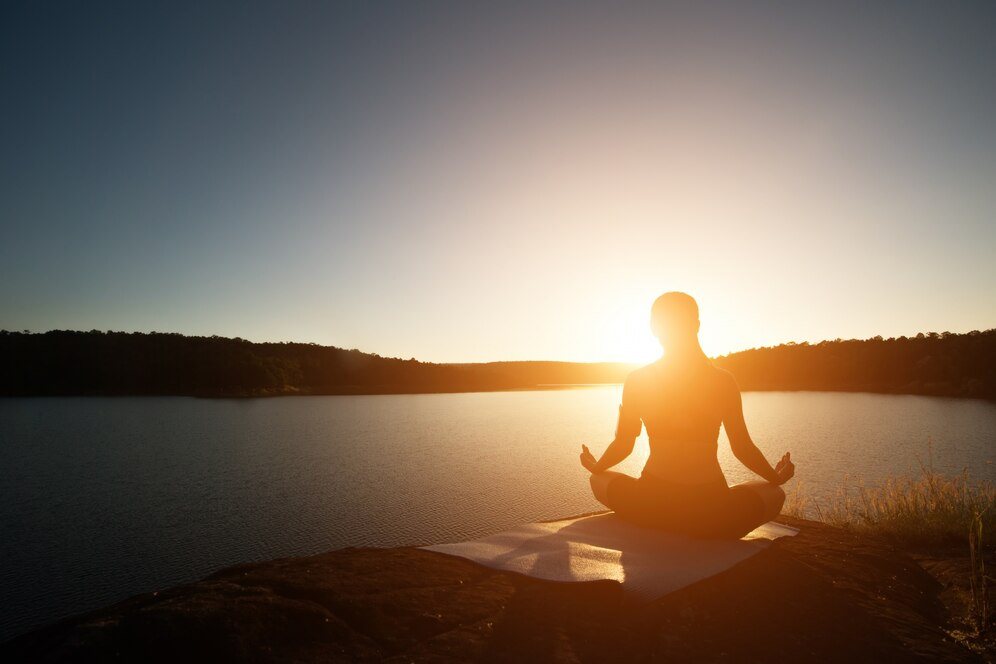Juggling work, family, and life can leave anyone feeling drained and anxious. But what if there was a scientifically proven way to combat stress, improve your mood, and boost your overall mental well-being? Enter Yoga!
This ancient practice is more than just physical postures (asanas). Yoga offers a holistic approach to wellness, combining physical movement, breathing exercises (pranayama), and mindfulness meditation to create a powerful tool for mental fitness.
The Science Behind Yoga’s Magic
Yoga’s impact on mental health goes beyond simply feeling good after a session. Here’s how science explains its benefits:
Stress Slayer: The Calming Switch
Feeling like you’re constantly on edge? There’s a reason for that. Chronic stress triggers the “fight-or-flight” response, flooding your body with stress hormones like cortisol. This can lead to anxiety, irritability, and difficulty concentrating.
Studies, like the one published in the Journal of Alternative and Complementary Medicine, show that yoga activates the parasympathetic nervous system, responsible for the “rest and digest” response. This counteracts the stress response, lowering cortisol levels and promoting relaxation. It’s like hitting a pause button on your worries, allowing your body and mind to unwind.
Mood Booster: Chemical Cocktail for Happiness
Feeling down? Yoga might be the natural mood booster you’ve been searching for. Here’s the science:
Chemical Shift:
Yoga postures and breathing exercises (pranayama) can stimulate the production of mood-boosting chemicals like dopamine and serotonin. These neurotransmitters play a crucial role in regulating mood, motivation, and feelings of well-being.
Mindfulness Matters:
Yoga’s emphasis on mindfulness helps break the cycle of negative thoughts that can contribute to depression and anxiety. By becoming more aware of your thought patterns, you can learn to detach from negativity and cultivate a more positive outlook.
Research published in Depression and Anxiety adds weight to this. The study suggests that yoga can be as effective as medication for treating mild to moderate depression. This is particularly encouraging for those seeking a natural and holistic approach to managing their mental health.
Focus Champion: Sharpening Your Cognitive Edge
Can’t seem to focus on that important project? Yoga might be the answer. Regular yoga practice has been shown to improve circulation and oxygen flow to the brain. This can lead to several cognitive benefits, including:
Enhanced Concentration:
Improved blood flow to the brain areas responsible for attention can significantly enhance your ability to focus and concentrate. Imagine finally tackling that project without getting sidetracked every five minutes!
Sharper Memory:
Studies, like the one in the International Journal of Yoga, suggest that yoga can enhance cognitive function and memory. This may be due to increased neuroplasticity, and the brain’s ability to form new connections and adapt to new information.

Sleep Savior: The Path to Restful Nights
Tossing and turning all night? Chronic stress and a busy mind can wreak havoc on your sleep. Yoga’s relaxation techniques and stress-reducing properties can significantly improve sleep quality in several ways:
- Reduced Stress Hormones: As mentioned earlier, yoga lowers cortisol levels, promoting relaxation and preparing your body for sleep.
- Improved Relaxation Response: The deep breathing exercises and gentle movements practiced in yoga activate the relaxation response, making it easier to fall asleep and stay asleep.
- Mindfulness for Quieting the Mind: Yoga’s emphasis on mindfulness helps quiet racing thoughts and anxieties that can often keep you up at night.
A study published in The Journal of Clinical Psychiatry showed yoga’s effectiveness in treating insomnia. Participants in the study experienced significant improvements in sleep quality and duration, leading to deeper, more restorative sleep.
Finding Your Perfect Yoga Practice
The beauty of yoga lies in its vast diversity. Unlike a one-size-fits-all approach, yoga offers a spectrum of styles to cater to any preference, fitness level, or desired outcome. Here’s a detailed breakdown of some popular yoga styles to help you find your perfect match:
For the Beginner: Hatha Yoga – Your Foundation
Starting your yoga journey? Look no further than Hatha yoga. This gentle and foundational style is perfect for beginners as it focuses on basic postures (asanas) and breathing exercises (pranayama). Think of Hatha as the building blocks for a strong and mindful practice. Here’s what to expect:
- Focus: Learning proper alignment in basic postures, building flexibility and strength, and mastering fundamental breathing techniques.
- Benefits: Improved posture, stress relief, enhanced body awareness, and a solid foundation for exploring other styles.
- Perfect for: Anyone new to yoga, those seeking a low-impact workout, or individuals recovering from injuries.
For the Energized Soul: Vinyasa Yoga – Flowing with Your Breath
Feeling sluggish or uninspired? Vinyasa might be your answer. This dynamic style synchronizes movement with breath, creating a flowing sequence that can be both invigorating and mood-boosting. Imagine a dance-like experience where each breath guides you seamlessly from one posture to the next. Here’s what to expect:
- Focus: Linking movement with breath (ujjayi breathing), building strength and endurance, and cultivating a sense of flow and rhythm.
- Benefits: Increased energy levels, improved cardiovascular health, enhanced coordination, and a sense of exhilaration.
- Perfect for: Those seeking an energetic workout, individuals looking to boost their mood, or people who enjoy a dynamic and challenging practice.
For the Relaxation Seeker: Yin Yoga – Finding Inner Peace
Need to unwind and de-stress after a long day? Yin yoga offers a gentle and introspective practice that focuses on holding passive floor postures for extended periods. This practice allows you to sink deeply into your connective tissues, promoting deep relaxation and mindfulness. Here’s what to expect:
- Focus: Cultivating stillness and mindfulness, targeting deep connective tissues and fascia, and promoting overall relaxation.
- Benefits: Improved flexibility, stress reduction, enhanced self-awareness, and a sense of inner peace.
- Perfect for: Those seeking stress relief, individuals with tight muscles or injuries, or people who enjoy a calming and meditative practice.
For the Ultimate Relaxation: Restorative Yoga – Supported Serenity
Craving complete relaxation and letting go of all tension? Restorative yoga is your haven. Similar to Yin yoga, it involves holding passive postures for extended periods. However, restorative yoga uses props like bolsters, blankets, and blocks to fully support your body in comfortable positions, allowing for complete surrender and release. Here’s what to expect:
- Focus: Deep relaxation, passive stretching, and quieting the mind through stillness.
- Benefits: Improved sleep quality, stress reduction, pain management, and a sense of rejuvenation.
- Perfect for: Anyone seeking deep relaxation, individuals with chronic pain or discomfort, or people who enjoy a deeply supported and restorative practice.
Taking the First Step:
Ready to ditch the stress and unlock the mental wellness benefits of yoga? Here’s how to get started:
Find Your Tribe: Cultivating Connection and Comfort
- Studio Scouting: Many yoga studios offer classes for all levels and needs. Sign up for introductory packages or drop-in classes to explore various styles. Don’t be afraid to chat with instructors and fellow yogis to find a welcoming environment.
- Online Oasis: If a studio setting isn’t your jam, online classes offer incredible flexibility. Platforms like DoYogaWithMe and Yoga International provide a vast library of classes for all levels, taught by experienced instructors. You can practice at your own pace in the comfort of your own home.
- Style Safari: Yoga offers a diverse spectrum. Explore different styles like Hatha (foundation for beginners), Vinyasa (energetic flow), Yin (deep relaxation), and Restorative (supported serenity) to find what resonates most with your body and mood.
Start Slow and Be Kind: Gentle Beginnings, Powerful Results
- Beginner’s Grace: Remember, everyone starts somewhere! Be gentle with yourself, especially if you’re new. There’s no pressure to achieve perfect poses. Focus on listening to your body, respecting its limitations, and finding what feels good in the moment. Many studios and online platforms offer beginner-friendly classes and tutorials to guide you through the basics.
- Embrace the Breath: Breathwork (pranayama) is the lifeblood of yoga. Pay attention to your inhales and exhales, using your breath to guide your movements and deepen your focus. Think of your breath as a waveguiding your body through each posture.
Consistency is Key: Unlocking the Full Potential
- Regular Practice, Remarkable Results: Like any form of exercise, consistency is crucial to reap the full benefits of yoga. Aim for a few yoga sessions per week, even if they’re short. As you become more comfortable, gradually increase the duration or frequency of your practice.
- Small Steps, Big Impact: Even short daily yoga sessions can make a significant difference in your mental well-being. Start with 15-minute practices and gradually increase as you build strength and stamina.
Integrate and Habit-ify: Yoga as a Way of Life
- Weaving Yoga into Your Day: Make it a part of your daily routine! Start your day with invigorating sun salutations to awaken your body and mind. Or, end your day with calming Yin yoga poses to unwind and prepare for a restful sleep.
- Beyond the Mat: Yoga’s principles extend beyond the physical practice. Integrate mindfulness techniques into your daily life. Pay attention to your breath throughout the day, especially during stressful moments.
Enjoy the Journey: Celebrating Progress and Embracing the Fun
- Patience is a Virtue: Yoga is a lifelong practice. Don’t expect instant results or perfect poses. Celebrate your progress, no matter how small. Focus on the journey of self-discovery and the joy of movement.
- Laughter is the Best Medicine: Yoga doesn’t have to be serious! Don’t be afraid to laugh at yourself if you lose your balance or can’t quite reach your toes. Embrace the fun and enjoy the process of learning and exploring your body’s capabilities.
Unroll Your Mat and Unwind Your Mind.
Boost your brainpower, and experience the magic of yoga! Here are some additional resources to help you on your journey:
- DoYogaWithMe: https://www.doyogawithme.com/ – Offers a vast library of free and paid online yoga classes for all levels.
- Yoga International: https://www.yogainternational.com/ – Provides in-depth online courses, tutorials, and articles led by experienced yoga teachers.
- Yoga Journal: https://www.yogajournal.com/ – A comprehensive website with articles, pose tutorials, and class listings to guide you on your yoga exploration.
Remember, yoga is a personal practice. Don’t be afraid to experiment, find what resonates with you, and most importantly, have fun! Embrace the journey as you unlock the transformative power of yoga for a happier, healthier you, equipped with a calmer, clearer mind to navigate life’s challenges. So, unroll your mat, unwind your mind, and experience the magic of yoga!


